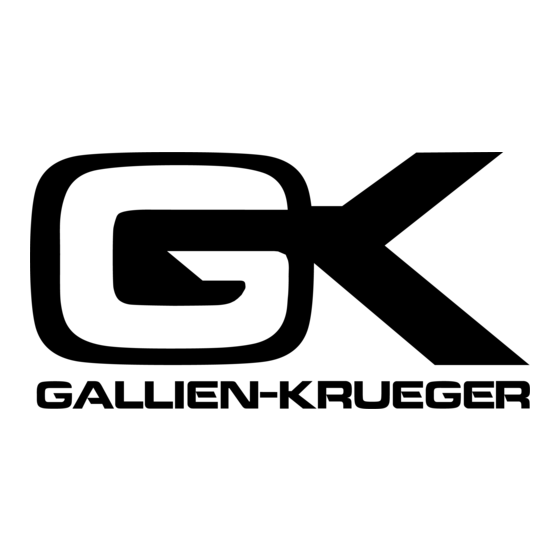Gallien-Krueger Neo 1001/212 Посібник користувача - Сторінка 10
Переглянути онлайн або завантажити pdf Посібник користувача для Підсилювач Gallien-Krueger Neo 1001/212. Gallien-Krueger Neo 1001/212 12 сторінок. Neo series bass combo amplifier

Neo Series Bass Combo Amplifi er
Tech Talk
Your GK amplifier is designed to be flexible and
user-friendly for maximum performance. This is
accomplished through these important features:
High Current Capability: When a power amplifi er
is pushing a speaker cone and it needs to reproduce a
high-power transient like a string slap, the amp must
be able to deliver a high current pulse to maintain
cone control. If the amplifi er can't do this it simply
cuts the transient off, producing an unresponsive
less out front sound. Creating these high current
pulses requires extra power devices (four times the
current required to deliver its rated power), larger
supply capacitors, and intelligent protection logic.
GK is the only instrument amplifi er manufacturer
that goes to the trouble and expense, and it is a big
reason why GK amplifi ers sound louder and cleaner
than other brands at the same power rating.
Active Equalization:
There are a wide variety of
equalizers used in instrument amplifi ers today. Passive
equalizers are great but only allow you to cut (signal
loss), not boost (signal gain). Graphic equalizers
provide plenty of variation, but are much better for room
equalization. When used with instruments, they tend
to sound unnatural or synthetic. Parametric and semi-
parametric equalizers can sound natural and offer a great
deal of fl exibility but require some technical knowledge
and great ears. The equalizer in GK amplifi ers is unique
in the industry and refl ects over 30 years of continuous
development and refi nement. We've developed a
rotary, four-band, active equalizer optimized for bass
guitar. The active circuitry allows you to either boost
or cut at a given frequency with greater integrity in
signal reproduction. The treble is a shelving type control
that boosts the high frequencies evenly. Respectively,
the bass is a shelving control that evenly boosts the
low frequencies. The high mid and low mid are peak
(bandpass) type controls with fairly wide Q (bandwidth)
patterns which are much more 'musical' sounding. Each
of the four bands are connected in series, meaning the
output of the fi rst band is fed directly into the input
of the next and so on. This eliminates the rippling or
combing that can happen with parallel EQ circuits.
The overall result from all of this is an equalizer that's
fl exible, yet easy to use and sounds natural even at
extreme settings.
Voicing Filters:
simplifi es the process of shaping and coloring your
tone, enabling the amplifi er to accommodate a wide
variety of playing styles with minimal fuss.
4/5 String Bass:
The 4/5 String fi lter extends the
low frequency range of the amplifi er to accomodate
the extra low range of the B string on 5 and 6 string
bass guitars. 4 string players may also fi nd desirable
results with this fi lter as well.
Contour: The Contour is based on the same contour
circuit as the 800RB, but adds a variable control for
precise tone shaping. With the control at zero, the
response is essentially 'fl at', as in no shaping. As
the contour is increased, it scoops out the midrange
while subtly emphasizing the lows and highs.
Additionally, it compensates to keep the overall
volume level constant. With it's variable control, the
Contour will accomodate everyone from the smooth
fi nger-style player to the aggressive slap player.
Presence: The Presence control adds extra sparkle
on the high-end for better clarity and 'openness' in
your tone. This is particularly useful when soloing
or playing chords.
The Valve Effect (Boost):
incorporates what we call the Valve Effect, or
G.I.V.E (Gate Induced Valve Effect) technology.
We use fi eld effect devices with the gate biased in
such a way that emphasizes the optimum harmonic
content of the signal. This is controlled by the
Boost knob. Raising the Boost while lowering the
Master will add more growl while keeping the sound
level relatively consistent. The 'growl' is actually
a small amount of even order harmonic distortion.
For most playing situations, start with the Boost at
12 o'clock. Reduce for a cleaner sound or increase
for more growl.
10
The three-stage voicing fi lter
Your GK amplifi er
